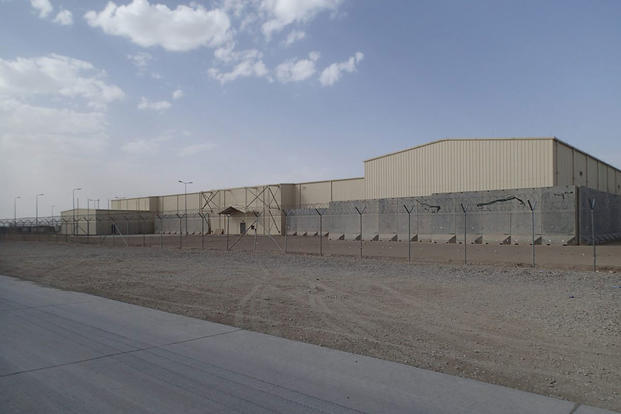The former U.S. Army general who overruled commanders in the field to approve the construction of a $36 million building that went unused in Afghanistan retired earlier this year as the service's inspector general.
John Sopko, the watchdog for the effort to rebuild Afghanistan, known as the Special Inspector General for Afghanistan Reconstruction, on Wednesday released an audit of the 64,000-square-foot complex at Camp Leatherneck in Helmand Province, concluding it was a "waste of taxpayer dollars."
Megan McCloskey and Vince Dixon, reporters with ProPublica, an investigative journalism nonprofit in New York, also on Wednesday wrote about the project in an article titled, "Boondoggle HQ: The $25 Million Building in Afghanistan Nobody Needed."
While the expense is small relative to the more than $100 billion the U.S. has spent on relief and reconstruction efforts in the country, the facility -- with its plastic-wrapped furniture and office equipment -- has become a symbol of the wasteful spending and lack of accountability that plague warzone contracting. It was designed for the 2010 surge of American troops to the country, but wasn't completed until 2013, long after the surge ended and the future of the base was in doubt.
As the ProPublica story and others have noted, the man who was arguably most responsible for the construction of the building, Peter Vangjel, was not only later promoted from major general to lieutenant general, he was also tapped to become the Army's own inspector general, charged with investigating waste, fraud and abuse within the largest branch of the military.
The U.S. Senate on Nov. 10, 2011, confirmed Vangjel for his third star and, a few days later, on Nov. 14, he was sworn in to become the 64th Inspector General of the United States Army. He served in the position for three years until retiring from the service in February.
Vangjel was unable to be reached by telephone for comment.
A few months before Vangjel's retirement, Sen. James Inhofe, R-Oklahoma, took to the floor of the Senate to praise him for "providing independent and unbiased advice" to Army Secretary John McHugh and Army Chief of Staff Gen. Raymond Odierno.
The senator, who has railed against government waste and who was once named a "taxpayer hero" by a watchdog group, also lauded Vangjel's "creativity" in helping the Army save billions of dollars while deploying the additional personnel and equipment into Afghanistan.
"He supervised efforts that provided nearly $8 billion dollars in cost avoidance and streamlined contracting and logistic support efforts as our troops surged in to Afghanistan and retrograded from Iraq," Inhofe said, according to a transcript of his remarks.
Inhofe's office didn't immediately respond to an e-mailed request for comment.
Beginning in 2010, multiple generals in the field opposed breaking ground on the new command and control facility, which would be named 64K and cover an area larger than a football field.
Indeed, three generals wanted to cancel the project, including then-Maj. Gen. Richard Mills, who as head of Regional Command Southwest oversaw all Marines in Helmand Province; then-Maj. Gen. Timothy McHale, a deputy commander of U.S. forces in Afghanistan; and then-Maj. Gen. William Buckler, who was in charge of the joint engineering command, according to the SIGAR investigation.
But Vangjel overruled them all, saying it wouldn't be "prudent" to do so because the project was listed as a "requirement" in a future war budget, known as funding for overseas contingency operations, or OCO in military parlance, it states.
"Currently, this facility is also listed in the FY 12 OCO emerging requirements … Therefore, cancelling the FY10 project, which has appropriated funds, and reprogramming it for a later year is not prudent," he wrote in a memorandum, according to the audit.
Vangjel didn't cite any other basis for rejecting the request -- nor dispute Buckler's assessment that the building wasn't called for under a master plan for military basing in Afghanistan, the document states. Vangjel later told investigators that the facility was part of "a larger strategic plan" for Camp Leatherneck to serve as a long-term base in the country, but he wasn't able to point to any documents, either classified or unclassified, to support that claim, it states.
"General Vangjel's decision to reject the request to cancel the project seems to have been based on a reluctance to reprogram funds already appropriated by Congress, rather than on a reasonable determination that the 64K building addressed an operational need," the report states.
The audit also criticized the military's multiple investigations into the case for essentially whitewashing the matter. One review led by Maj. Gen. James Richardson concluded no one was at fault for the construction of the building, though Richardson never interviewed Vangjel, it states. Another was likely compromised when a legal adviser helping conduct the review, Col. Norman Allen, may have "coached" Vangjel on how to respond, it states.
The report recommended for the Pentagon to determine "appropriate administrative or disciplinary actions" for Vangjel "in light of his decision to construct the 64K building over the objections of commanders in the field, resulting in the waste of $36 million." It recommended the same for Richardson "in light of his failure to carry out a fulsome investigation in compliance" and for "Allen in light of his failure to comply with law, regulation, and his ethical and professional responsibilities."
Deputy Defense Secretary Bob Work on Feb. 9 responded to Sopko on behalf of then-Defense Secretary Chuck Hagel and defended the senior officers.
In a written response, Work said Vangjel determined that his subordinates' views "were not fully informed by the combatant command's strategic vision at that time." His actions, as well as those of Richardson and Allen, "do not represent misconduct warranting consideration of administrative or disciplinary action."
-- Brendan McGarry can be reached at Brendan.McGarry@military.com.




























